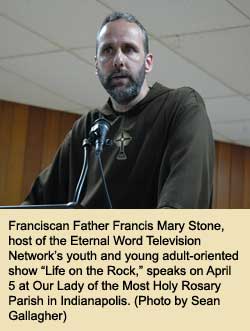A ‘new breed’ of priests and religious:
Vocations from the ‘JP II generation’

By Sean Gallagher
 A little over a year ago, thousands filled St. Peter’s Square in Rome on the evening that Pope John Paul II died. Millions from around the world found their way to Rome in the days to come to mourn his passing. (See also: Franciscan friar embodies qualities of priests from the ‘JP II generation’)
A little over a year ago, thousands filled St. Peter’s Square in Rome on the evening that Pope John Paul II died. Millions from around the world found their way to Rome in the days to come to mourn his passing. (See also: Franciscan friar embodies qualities of priests from the ‘JP II generation’)
Many of them were young people who were either born or became adults while John Paul served as the bishop of Rome.
Franciscan Father Francis Mary Stone, host of the Eternal Word Television Network’s youth and young adult-oriented show “Life on the Rock,” recently spoke about the seminarians, priests and religious who have come from this “JP II generation” in a presentation on April 5 at Our Lady of the Most Holy Rosary Parish in Indianapolis.
Although 45, he considers himself a part of that generation—albeit at the far end of it.
In his ministry at EWTN over the past 15 years, Father Francis has met many seminarians, priests and religious from the JPII generation.
Based on his observations, he laid out traits of the men and women from this age group that have discerned priestly or religious vocations.
First, he said that many had adult conversion experiences, stating that they had “virtually no childhood aspirations” to the priesthood or religious life.
Because they did not discern their vocation early on, many of them worked ambitiously for a period in the business world.
Father Francis spoke about this aspect from his life, where he worked as a business and litigation analyst in California and Michigan.
“We’re familiar with the rabid, unfettered capitalism that the world in some ways—not always subtly either—kind of throws out at us,” he said. “We’re familiar with the subjectivism, the secularism. We’re familiar with moral and doctrinal relativism. That’s the culture that the Lord still calls vocations out of.”
Because of their experience in the business world, those in the JP II generation who discern a priestly or religious vocation are not looking for another career.
“It’s a vocation that has reached into their heart, and taken it and pulled them,” Father Francis said. “They’re compelled to give themselves fully, 24/7. It doesn’t mean that they’re perfect. None of us are.”
The Church’s newer priests and religious also come from dysfunctional families, Father Francis said, that have been wounded by “an abortive, contraceptive, euthanasian mentality.”
“But our Lord still calls,” he said. “There’s no doubt about it. He still calls. The response for us is ‘Yes.’ He’s not looking for the perfect. If he wanted the perfect, I certainly wouldn’t be up doing ‘Life on the Rock.’ ”
In the wake of the clergy sex abuse crisis, Father Francis said that many young seminarians and priests have no tolerance for the behavior of the priests who abused young children and teenagers.
“We’re aware of it,” he said. “We see it. And these guys are fed up with it. I can tell you that across the board.”
Father Francis also said that many of the seminarians, priests and religious from the JP II generation have a great love for Mary and the Eucharist.
In particular, he said, many of the seminarians have been successful in advocating for an increase in opportunities for eucharistic adoration in their seminaries.
“As a lot of changes happen, it hasn’t happened from the top down,” Father Francis said. “It’s happened from the bottom up. Seminaries are changing that way.”
Next, Father Francis said that this “new breed” of priests and religious see Pope John Paul II as their hero. He also said that Pope Benedict XVI “sees the fire” that his predecessor set in the hearts of many young people, and is now at work to shape that enthusiasm.
“Now he wants in a good sense to contain that fire and move that crowd in the piazza, outside the doors of the basilica, into the basilica, into the heart of the Church,” Father Francis said.
He next spoke about this new generation of priests and religious’ respect for the Church’s discipline of priestly celibacy.
“We have no intention whatsoever of doing away with this longstanding discipline,” Father Francis said. “Without a doubt, this new breed clearly sees the reasonableness [of it]. On the natural level, it makes perfect sense. But on the supernatural level, it makes a whole lot of sense as well.”
Father Francis said also that the priests and religious from the JP II generation are marked by a love for the Church and its teaching authority.
“We look to and see the reasonableness of having the authority of the Church,” he said. “What a gift. In all its woundedness, in all its foibles, ... [we] thank God that we have the Church hierarchy.”
In the question-and-answer period that followed, Father Francis acknowledged that the members of the JP II generation are a minority in their overall age group.
However, he argued that the seminarians, priests, religious and lay members of the JP II generation are placing themselves in positions of influence both in the Church and the wider society.
He said that the growing teenage suicide rate, a growth in drug and alcohol addiction at younger ages, and the continuing breakdown of the family shows that the present is no time for relaxing.
“I tell my friar brothers all the time that we have work to do,” Father Francis said. ‘It’s not like John Paul has created this mass of mighty conversions, and we can now sit back and play hoops all day and just take it easy.” †
